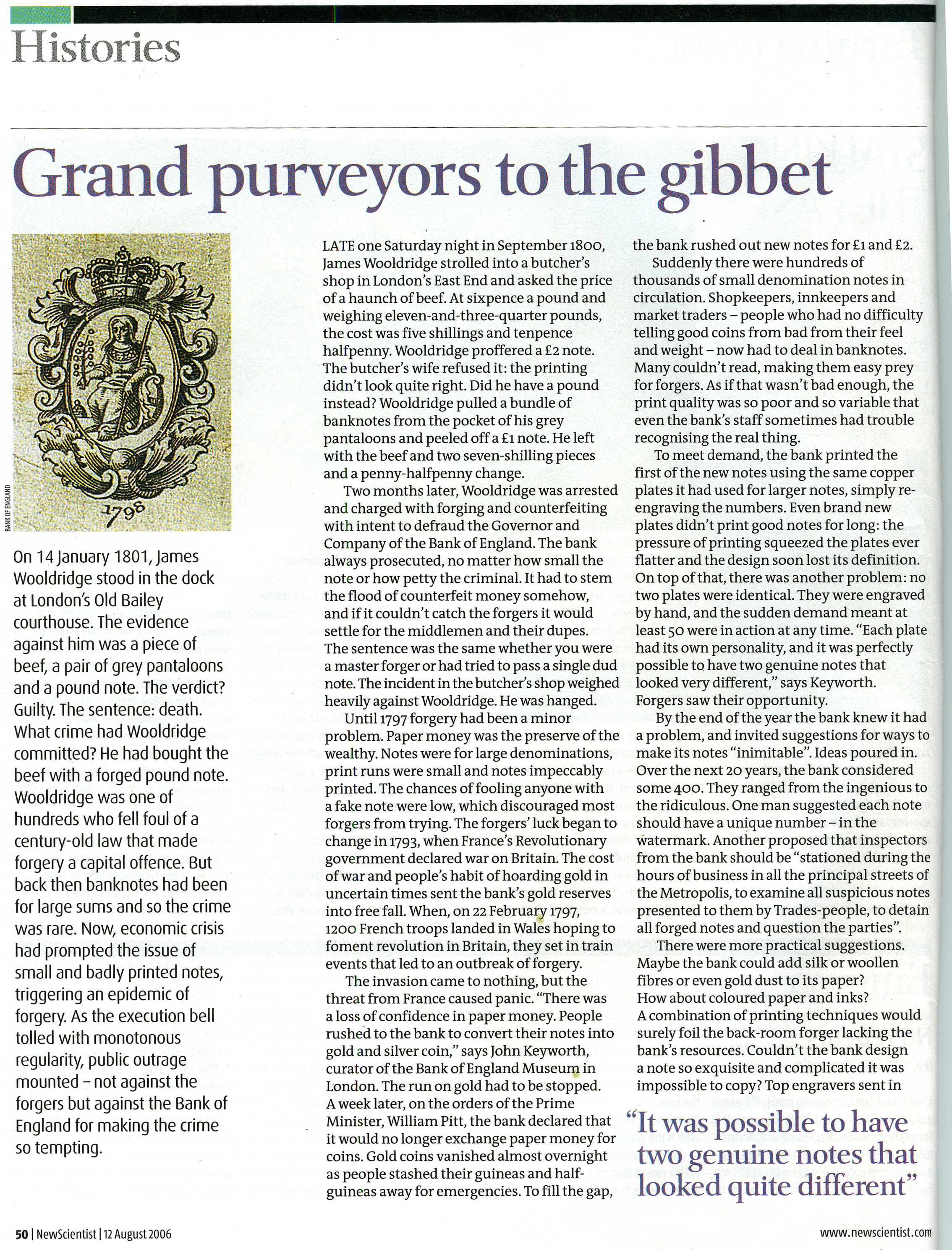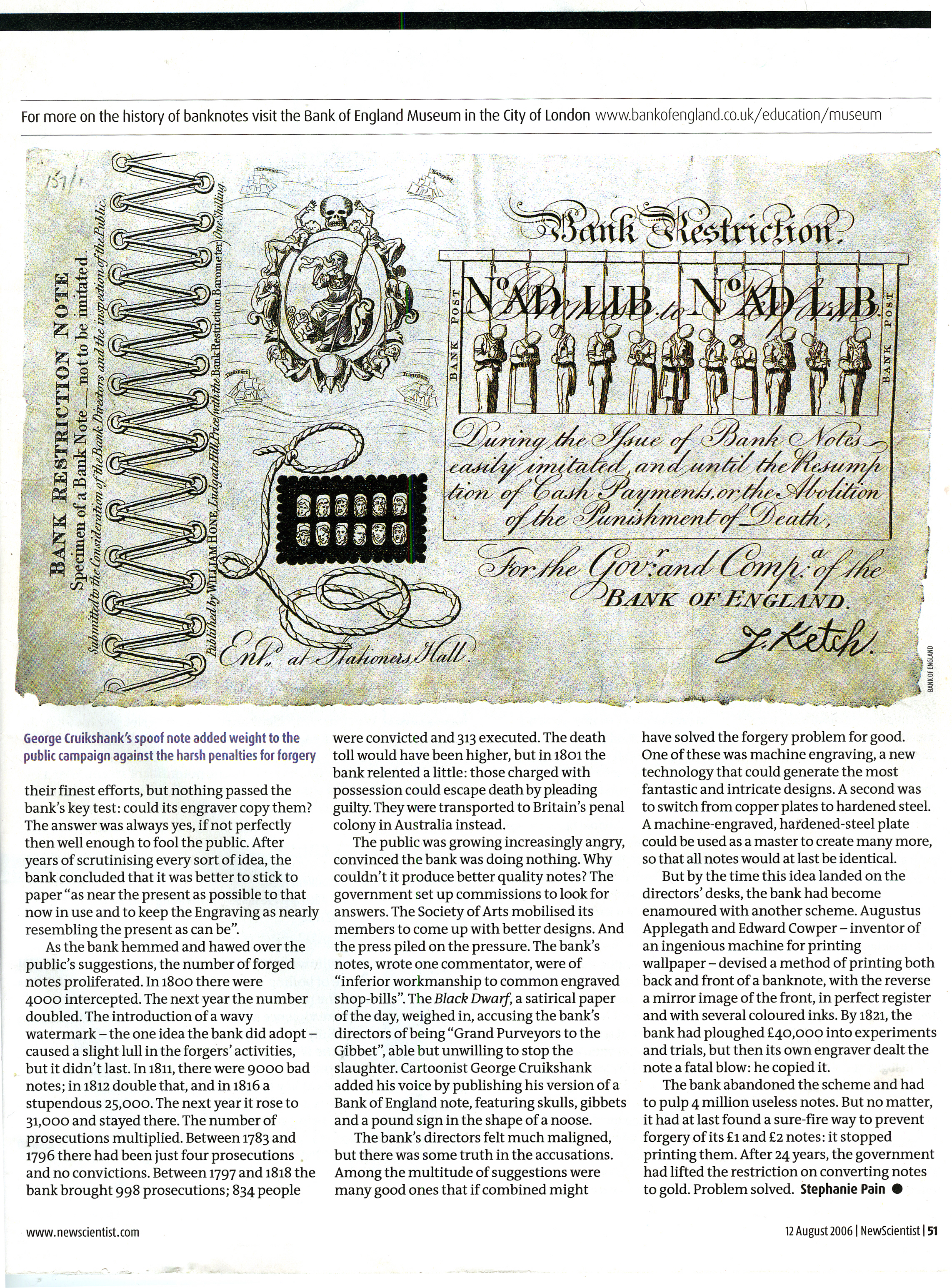

| Proceedings of the Old Bailey |
| http://www.hrionline.ac.uk/luceneweb/ |
GEORGE DAWSON, offences against the king : coining, 1st December, 1819.
The Proceedings of the Old Bailey Ref: t18191201-52
See original
Trial Summary:
* Crime(s): offences against the king : coining,
* Punishment Type: death,
* Verdict: Guilty,
* Other trials on 01 Dec 1819
* Name search for: GEORGE DAWSON,
* Crime Location: St. James, Clerkenwell Spencer-terrace, Goswell-street-road
* Associated Records...
Original Text:
52. GEORGE DAWSON was indicted for that he, on the 20th of November, at St. James, Clerkenwell, feloniously did dispose of and put away a certain forged and counterfeit Bank note (setting it forth, No. 17257, 1 l. dated September 22, 1819, signed S. Leate), with intent to defraud the Governor and Company of the Bank of England , he well knowing the same to be forged and counterfeited .
SECOND COUNT, for feloniously offering to one Charles Bourne Brind , a like forged and counterfeit Bank note, with a like intent, knowing it to be forged and counterfeit.
THIRD AND FOURTH COUNTS, the same, only calling the forged instrument a promissory note for payment of money, instead of a Bank note.
FIFTH, SIXTH, SEVENTH AND EIGHTH COUNTS, the same, only stating the prisoner's intent to be to defraud one Thomas Buckthorp .
Counsel for the prosecution, as before.
CHARLES BOURNE BRIND . I am shopman to Mr. Buckthorp, who is a grocer, and lives in Spencer-terrace, Goswell-street-road. On Saturday, the 20th of November, about one o'clock in the day, the prisoner came to the shop, and said he wanted some stuff for children, but he did not know the name of it. I asked him if it was semolina? he said he believed it was - he had one pound, which came to 1 s. 4 d., and tendered me a 1 l. Bank note. I asked him who it was for? he said it was for William Greaves , Esq., No. 15, Guildford-street. He was dressed as a gentleman's servant, with a linen jacket on. I wrote the name and address on it, and put it into the till - (looks at one) - this is it. My master was behind the counter. I found we had not change enough in the till, and asked Mr. Buckthorp for some silver. The prisoner then said he might as well take the tea from our shop. He had a quarter of a pound of 10 s. tea, and a pound of sugar, which came to 4 s. 7 d. together. My master gave me the silver, and I gave the prisoner the change. My master then took the note out of the till, and said he did not like it - the prisoner took it out of his hands, and said he did not see where the deficiency was; he asked Mr. Buckthorp how he could tell? - my master said he was satisfied it was a bad one, and that he should not let it go out of his possession. He took it out of the prisoner's hands, and asked what Mr. Greaves was? he at first said he was a gentleman - my master asked him afterwards, and he said he was an East India merchant. He then asked him where his counting-house was? he said in Lothbury, but he did not know the number - that the cook had taken the note of a butcher in Guildford-street, and upon my suggestion, Mr. Buckthorp went out with him to see if the address was right - they returned in five or ten minutes.
THOMAS BUCKTHORP . I have heard the account given by the last witness, it is correct. I left the shop with the prisoner - we went down Spencer-street; I then thought he wished to get from me. I said,
"Do you live with Mr. Greaves?" he said he did, but had not lived long there. He appeared to be trying to get from me - I collared him, and said,
"You do not live with Mr. Greaves," he said he did. I said,
"I am sure you do not." He caught hold of the iron rails and said,
"Pray let me go, and I will tell you." I said he should not, and took hold of him. Two men, who were standing by, refused to assist me. I took him back to my shop - several of my neighbours asked me to let them see the note. I never lost sight of it - they gave the note into my hands. The prisoner arose, made a snatch at it, and put it into his mouth. My lad, who was by, made a snatch at it, pulled a piece off, and said,
"I have got the number!" Mr. King, who stood by, caught hold of him by the throat, and we wrenched the note out of his mouth; the prisoner caught hold of it with his hand, I got it from him, pasted it together, and gave him in charge. I marked the note. He was searched, and four keys, 2 3/4 d., and a piece of leather found on him. This is the note - (looking at it).
Prisoner. Q. Did I attempt to run from you in the street - A. He was going to run when he was nearly at the end of Spencer-street.
THOMAS BURNIGE . I am a constable. I went to Mr. Buckthorp's shop on the 20th of November; the prisoner was there, scuffing very violently - Mr. Buckthorp said,
"I have got it!" I found it was a forged note - he gave the prisoner in charge. I asked him how he got the note? he refused to give any account of it. I took him away, and in going to the office I asked him if he had ever lived at No. 15, Guildford-street? he said he had not. I asked him where he got the note? he said he had been out of place, and sold his clothes for it, and that he lived at No. 5, Hemlock-court, Carey-street. I asked him where he sold the clothes? he said he sold them to a man in the street. I asked him if it was a Jew? he said he could not tell.
JAMES KING . I am a baker, and was at Mr. Buckthorp's. I assisted in taking the note out of the prisoner's mouth, and gave the two parts to Mr. Buckthorp - I saw him put them together.
DAVID VALENTINE . I live at Mr. Buckthorp's. I took part of the note out of the prisoner's mouth.
ANN FEARON . I live at No. 15, Guildford-street. No Mr. Greaves lives there - the prisoner did not live there in November. There is only one No. 15.
ANN LEICESTER . My husband keeps the Duke of Leicester public-house, Clement's-lane, Clare-market. On the 13th of November the prisoner came to our house, I knew him before. He and another person had liquor, which came to 2 s. 5 d.; he gave me a 1 l. note, I said I did not like it - he held it up to the lamp, and desired me to look at the watermark. I was not satisfied, and desired him to endorse it. He put
" William Williams , No. 7, Cow-lane, Smithfield," on it - (looks at it) - this is it. I remarked to him that that was not his name - he asked me what was his name? I told him he went by the names of Watson and Hunt. He said it was of no consequence what name he went by, Williams was his name.
Prisoner. Q. Have I been at your house since I paid you the note - A. On the Monday evening after; it was returned to me that afternoon. We sent for an officer to detain him, but he would not take him. He was there a long while.
THOMAS GLOVER . I am an inspector of Bank notes. The note is forged in every respect, and is not Leate's signature - the other is also forged in every respect, and is not the signature of N. Stock - they appear to be impressed from the same plate and manufacture in every respect, and are of the same date.
STEPHEN LEATE . I am a signing clerk. The signature is not my writing, or any clerk of the Bank.
(The note was here put in and read.)
Prisoner's Defence. When I went to the grocer's for the tea and semolina, I did not conceive I had a right to put my name on the note, but thought I might put any other as well as my own; I did not know that was a breach of the law - I did not know it was forged. He said he would compare it with another - I asked him where the deficiency was? he shewed me, and held them both in his hand; I could have taken them both from him if I had been inclined. Does it appear likely that I should stand close to the door. and not have run away rather than subject myself to a prison. He said he would go with me - I knew I had given a false address, and did not like to go with him. I did not attempt to run - he says he thought I was going to run; if I had wished to run he could not have detained me, for the men would not assist him. When we returned to the shop it was full of people. I sat down - he shewed the note to a gentleman, and said he would give me in charge. I thought rather than go to prison, as I had formed a dreadful idea of a prison - to avoid it I snatched the note, and thought I had a right to destroy it as it was my own. I never had a Bank note in my life but what cost me 20 s., or labour to that amount. I have no connexion with men who traffic in notes, though I have been locked up fourteen days with men who boast of their robberies. They use every means to get notes into the hands of unwary persons - if I have been so unfortunate I cannot help it. One morning I met a man, and sold the two coats for 1 l., he went with me to Field-lane; when we came to Furnival's Inn, he said,
"There is a man I know, you had better sell them to him," which I did - I expected him here. It appears to me that he and the man are connected - his name is Arthur Hibbens .
GUILTY . - DEATH . Aged 29.
Second Middlesex Jury, before Mr. Justice Bayly.

